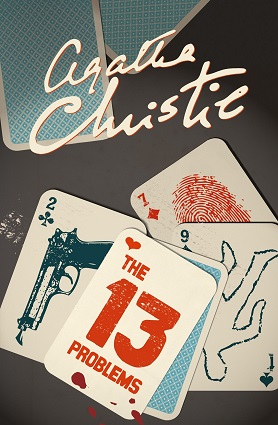Six people gathered at a house to talk murder on Tuesday night. Well, not strictly true, but every Tuesday night, they all met to listen to one of them tell a tale of a mystery that they have been a part of. At the end of the tale, they all speculate on what really happened, and who was guilty of doing what. And then they look to the little old lady, sitting knitting in the corner, to tell them the truth of the matter, as it seems that Jane Marple has an insight into everything.
And then another gathering of six people get together (admittedly with Jane Marple again involved) and do the same thing. And then there’s a thirteen problem…
Now why would I be reviewing this set of short stories now? I wonder… Would it be anything to do with the imminent release of “Marple”, a set of twelve short stories by twelve different authors? Well, obviously. I thought it would be best to look at those stories after reminding myself of the original thirteen stories.
The first six were the first appearances of Miss Marple, with The Tuesday Night Club appearing the Royal Magazine in December 1927. The second set of six began to appear in December 1929 and all thirteen were collected in 1932, after Miss Marple’s first appearance in a novel, The Murder At The Vicarage in 1930.
It might well be that Christie took a while to work out how to best make Miss Marple work in novel form, as she next appeared in novel form in 1942. These short stories, for the most part, don’t have her taking an active part in an investigation. Even the final story, Death By Drowning, sees Miss Marple handing Sir Henry Clithering a piece of paper saying who a murderer is and then Clithering himself trying to find some evidence.
These are for the most part very enjoyable tales. There is nothing on the level of the best short stories by John Dickson Carr, but there is some clever stuff here. What is interesting, though, is the clueing of the tales. Or the lack of it.
I’m pretty sure one of the criticisms that will be directed at Marple is the lack of Christie-level clueing for the most part, but that’s not really fair in the short story form, as it’s mostly missing here too. Take the aforementioned Death By Drowning. Miss Marple works out who did it by a parallel to a local situation and then Clithering persuades the murderer to confess. It’s a really good little story, but there isn’t a clue to be seen. Similarly, I imagine there will be criticism of tales that deviate from the expected form – in that case I offer you The Affair At The Bungalow.
All in all, these are clever stories, with some nice touches even in the conversational bits – Dolly Bantry’s first attempt at her story is a real highlight. It’s been a long time since I’ve read these and it was really nice to revisit them. At the end of the day, perhaps they shouldn’t be directly compared to the tales in Marple due to the fact that Miss Marple spends almost all of these stories sitting in a corner whereas in the new stories, she takes a much more active role. But that’s a book to talk about next time…
NB: Just a thought – did the original short stories inspire The Poisoned Chocolates Case?


I also enjoyed these stories, although it recently occurred to me that the person who presented “The Affair At The Bungalow” must really have been incredibly dim-witted – I won’t go into details (minor spoiler alert here) but just imagine what would have happened if her plan had gone ahead and any of those who’d been present heard about it…
LikeLike
Oh quite. But it makes an interesting change – you can see Christie playing around a bit with this and Dolly’s story as she gets towards the end of these.
LikeLike